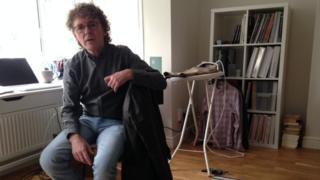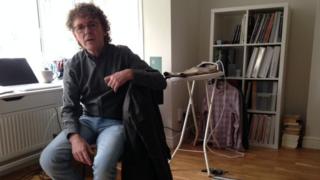Autism diagnosis: ‘I want 40 years of my life back’
People diagnosed with autism in adulthood describe growing up believing they were “bad” or “alien”. …


For most of his life, Barney Angliss struggled to fit in. At the age of 49, he finally had a diagnosis that helped him understand why.
As a child, he remembers his family not allowing him to go to a new school. “They thought I would be bullied to death”.
Although he was good with words he had few friends and – by his own admission – he lacked empathy and social skills.
By the time he had a home, a family and a job as a teacher, “catastrophic thoughts” were building up.
He felt increasingly depressed and inadequate, and his physical health was suffering too – with severe bouts of asthma becoming more and more regular.
Finally, prompted by his wife, Barney saw a clinical psychologist – and was diagnosed with Asperger’s.
He says suddenly his lack of social skills, his bluntness and constant search for order made sense. “It explains all of my failures.”
Robert Greenall, 53, a BBC journalist, recently learnt he is also on the autistic spectrum.
“All my life, I’d been wondering why I could never quite ‘get’ other people, and they could never quite ‘get’ me,” he says.
“You’re an enigma” or “you’re on another planet” were jibes he heard frequently.
For a long time he thought it was to do with being an only child, or being sent to boarding school and having an isolated childhood.
While he loved looking at maps and reading about railways, other boys seized on his awkwardness and lack of confidence on the sports field.
As an adult, he found social interaction hard and small talk at parties a nightmare. He wondered why he couldn’t read people’s emotions and show empathy.
‘I felt like an alien’
But the pieces didn’t quite fit – until he watched a TV programme about autism.
“The stereotyped view that I’d always had of autistic people was that they were either very severely disabled and unable to communicate, or formidable computer geeks.
“But seeing people in the documentary who seemed perfectly normal getting diagnosed, and identifying with them in so many different ways, was a revelation.”
Robert felt “immense relief” following his diagnosis.
“Finally I had a name for the thing that had made me feel like an alien for so long. Finally I could stop feeling bad about being different.”
Barney and Robert are just two of an unknown number of older adults who have spent much of their lives not knowing why they feel different.
With autism first classified as a mental disorder in 1980, people born before then may have gone undiagnosed or been misdiagnosed.
Around 700,000 people are thought to be autistic in the UK, and more are being diagnosed all the time, says Anna Bailey-Bearfield, policy and public affairs manager at the National Autistic Society.
“Autism is often seen only to affect children but more autistic adults are now appearing on TV and people are starting to see themselves represented.”
But the impact of not knowing for 40 or 50 years “can be very traumatic”, she says, leaving people feeling anxious and socially isolated.
National guidance says people should wait no longer than 13 weeks, but 2019 NHS data showed a significant number waiting longer.
‘I couldn’t move on with life’
In Robert’s case it took 18 months “of to-ing and fro-ing, anxious phone calls and plenty of disappointments”.
He finally went for a private assessment, which cost £1,900. “I just wanted it all done. I felt I couldn’t move on with my life.”
He remembers the day clearly – and answered questions for six hours.
“Many of them had me searching for long-forgotten childhood memories – what textures did I like touching? Did I walk downstairs in a funny way?”
The result was a diagnosis of autism spectrum disorder.
“It was nothing more specific than that – there is too much confusion about definitions, so many specialists now tend to refrain from using any,” he says.
But the diagnosis of autism spectrum disorder later in life can be an overwhelmingly positive experience, research from Anglia Ruskin University suggests.
Dr Steven Stagg, who interviewed nine people over the age of 50, found it “allowed them to let go of impossible struggles and reframe their self-identity”.
For one person it was “a sort of eureka moment – I realised it wasn’t my fault”. For another it was “the relief of knowing what’s wrong, or what has been wrong”.
But there are often huge regrets too.
For Barney, who was interviewed for the study in Health Psychology and Behavioural Medicine, there is the realisation that those closest to him have suffered too.
“If I think back I can’t believe I was a teacher – not a very confident one, not able to communicate with people. And he says he realises now he had turned into a “stressy Dad”, his health had deteriorated and relationships were strained.
His diagnosis of Asperger’s was a turning point.
“Diagnosis has unlocked a totally different version of me,” he says.
He describes the day he organised industrial action among fellow school teachers as a notable achievement, and there have been others too.
From struggling to make friends, he now has hundreds – and although communication can sometimes be strained, he is able to be up front about who he is.
Speaking at events, organising festivals dedicated to specialist learning, writing, training and teaching about autism is now his focus.
Barney can now talk about what makes him who he is.
Fish and shirts
He loves the texture of raw fish, for example, and remembers always wanting to slice it for his mum.
“I would spend all my time feeling the inside of it.
“Fish has a grain, so does chicken. Depending on the way you cut it, the feeling is different. I just loved that.”
He also finds his shirts reassuring, and points to the “tiny herring-bone weave” of the one he’s wearing.
It’s one of 25 he owns, all with small details he is fond of. Just knowing they are there makes him feel in control.
Robert is still getting used to his diagnosis and what it might mean for him – but he was delighted when one friend said she was “proud to have a neurodiverse friend”.
What is autism?
It affects how a person communicates with and relates to other people, and how they experience the world.
People with autism see, hear and feel the world differently to others.
They can find it difficult to:
- understand facial expressions or tone of voice
- find it hard to form friendships
- be under- or over-sensitive to sound, touch and light
- like routine and order
- appear to be insensitive
- appear to behave “strangely”
One person’s condition can be very different to another’s and require different levels of support. Some also have mental health problems and learning disabilities.
The National Autistic Society and NHS have information about exploring an autism diagnosis as an adult.

